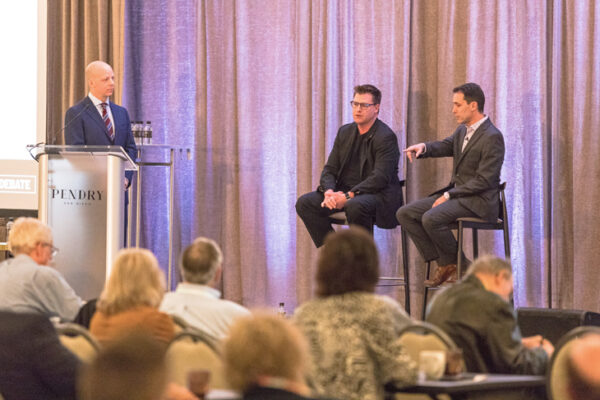Why the Anti-Capitalists Are Dead Wrong
- Anti-capitalists argue that current economic inequality shows that capitalism is “broken.” But this is a gross mischaracterization.
- As Alexander Green explains, no system provides more opportunities to build wealth and achieve success.
In his excellent new book The United States of Trump, my friend Bill O’Reilly explains why the president refuses to admit it when he’s wrong.
The short answer is he views it as a sign of weakness.
I think this approach works against Trump rather than for him.
In any event, I don’t have that luxury. I pick stocks for a living.
When a recommendation goes south – as one will from time to time – it’s like backing over your neighbor’s mailbox while he’s standing in the driveway.
It isn’t hard to determine who’s responsible.
However, some business leaders today have the opposite problem.
They are trying to create goodwill by apologizing for things they didn’t do wrong. Like generating profits for shareholders.
A while back, I pointed out that the Business Roundtable – a group made up of the CEOs of 192 of the largest U.S. companies – made a strategic blunder when it issued this statement:
Americans deserve an economy that allows each person to succeed through hard work and creativity and to lead a life of meaning and dignity… We commit to deliver value to all of them, for the future success of our companies, our communities and our country.
We already have a system that allows everyone to succeed, provided they work, save and invest. And the economy is hardly broken.
Unemployment is at a historic low. Household income is at a record high. So is household net worth.
This is the continuation of a long-term trend. American prosperity has been on the rise for well over a century.
No one talks about “the French dream” or “the Norwegian dream.”
No other country is universally recognized as the land of opportunity. And no country attracts more students, more immigrants or more foreign investment capital.
American businesses dominate the world.
It’s no coincidence that fantastic innovators like Amazon, Apple, Netflix, Google, Instagram, Twitter, Snapchat, Facebook, Uber, Airbnb and countless others were all founded here.
Our business leaders recognize that a company succeeds only if employees, suppliers and customers are satisfied, not just shareholders.
If you don’t agree, you’ve never run a business.
Undercompensate or disrespect your employees, and they will take their talents elsewhere. Bargain too hard with your suppliers – or pay them late – and they won’t trade with you.
As for customers, if they aren’t delighted – trust me – shareholders won’t be either.
Yet – by acting as if these things weren’t already the case – members of the Business Roundtable created an “aha” moment for socialists and anti-capitalists to proclaim that “even the billionaires” know the free market system needs to be reformed.
(And, indeed, a few actual billionaires, like Marc Benioff and Ray Dalio – who ardently want to sell their new books to the angry mob – may someday look back and wonder just what the heck they were thinking.)
Capitalism is the greatest anti-poverty program of all time – and the greatest creator of prosperity.
Yes, government has a role to play too. Someone has to defend the shores, enforce contracts and referee the game.
But look around the world. Heavy-handed government does not lead to more prosperity.
As I’ve pointed out before, the citizens of Scandinavia, for example, have lower incomes and smaller household net worth.
However, they do have one thing Americans don’t have: ultra-high taxes. And not just on the rich. The average top marginal tax rate in Scandinavia is 52%.
Anti-capitalists regularly describe our economic system as one based on greed, selfishness and exploitation.
That is a laughable mischaracterization.
The free market says you can have anything you want if you provide enough other people with what they want.
That’s how you get rich as a capitalist.
By thinking not about your own wants and needs but about the wants and needs of others – and how to satisfy them better than anyone else.
Companies that understand this – and can deliver on it – are the ones you want to own as an investor.
Incidentally, successful investors – also maligned as greedy creators of economic inequality – don’t just earn higher returns. Like businesspeople, they actively benefit society.
How?
Investment capital – the money you invest – drives the U.S. economy. It creates jobs. It increases productivity. It raises wages and living standards.
Those who would slow or handicap investment would negatively affect everyone in the United States.
Let’s hope a lot more people figure this out before next year’s elections.
[adzerk-get-ad zone="245143" size="4"]About Alexander Green
Alexander Green is the Chief Investment Strategist of The Oxford Club, the world’s largest financial fellowship. For 16 years, Alex worked as an investment advisor, research analyst and portfolio manager on Wall Street. After developing his extensive knowledge and achieving financial independence, he retired at the age of 43.
Since then, he has been living “the second half of his life.” He runs The Oxford Communiqué, one of the most highly regarded publications in the industry. He also operates three fast-paced trading services: The Momentum Alert, The Insider Alert and Oxford Microcap Trader. In addition, he writes for Liberty Through Wealth, a free daily e-letter focused on financial freedom.
Alex is also the author of four New York Times bestselling books: The Gone Fishin’ Portfolio: Get Wise, Get Wealthy… and Get On With Your Life; The Secret of Shelter Island: Money and What Matters; Beyond Wealth: The Road Map to a Rich Life; and An Embarrassment of Riches: Tapping Into the World’s Greatest Legacy of Wealth.






